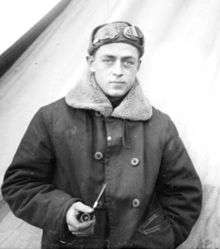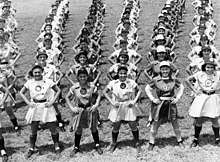Philip K. Wrigley
Philip Knight Wrigley (December 5, 1894 - April 12, 1977), sometimes also called P.K. or Phil, was an American chewing gum manufacturer and executive in Major League Baseball, inheriting both those roles as the quiet son of his much more flamboyant father, William Wrigley, Jr..
Philip K. Wrigley | |
|---|---|
 | |
| Born | December 5, 1894 Chicago |
| Died | April 12, 1977 (aged 82) |
| Nationality | American |
| Occupation | Chewing gum manufacturer and executive in Major League Baseball |
| Known for | Son of his much more flamboyant father, William Wrigley, Jr. |
Biography
Wrigley was born in Chicago. His father died in 1932 elevating Philip's role in the family business. He presided over the Wm. Wrigley Jr. Company, and also the family hobby, the Chicago Cubs, as owner until his death. He turned over the presidency of his chewing gum company to his son William Wrigley III in 1961, while retaining the presidency of the Cubs.

While the gum industry prospered, the Cubs grew less competitive over the decades. After an appearance in the 1945 World Series, they only had seven winning seasons in the next 32 years, including 16 straight losing seasons from 1947 to 1962. They did have a brief flurry of success (although no pennant championship) in the late 1960s and early 1970s. Although resisting installing lights at Wrigley Field to donate to the Navy during wartime, he was innovative in other ways. In 1961 he abolished the traditional field management/coaching structure and instead hired a "College of Coaches". This anticipated the specialization of coaches that is taken for granted nowadays. His one mistake, however, was not having a manager. Instead, he opted to have the various coaches as a "head coach." Without firm and consistent leadership, the Cubs continued to languish in the standings, despite having Cubs greats Ernie Banks, Ron Santo, and Billy Williams on the roster. Amid constant ridicule from the media and players, he dropped the head coach idea and hired Leo Durocher as the manager in 1966.
During World War II, Wrigley founded the All-American Girls Professional Baseball League as a promotional sideline to maintain interest in baseball as the World War II military draft was depleting major-league rosters of first-line players. The AAGPBL was immortalized in the 1992 film, A League of Their Own. In the movie, the character of Walter Harvey, a candy bar mogul, is loosely based on Wrigley.
Like his father, P.K. was a strong believer in maximizing media coverage. Starting in the 1920s, the Cubs' games were covered extensively on the radio, sometimes by competing stations at the same time, for minimal fees. In the post-World War II era, when baseball was booming, Wrigley continued this practice, allowing WGN-TV to carry all the home games as well as a significant number of road games. Some owners were aghast at Wrigley's "giving away the product", but it paid manifold dividends in the long run, as the evolution of WGN-TV into a superstation developed a truly nationwide fan base for the Cubs, which has resulted in nearly constant sellout crowds at "Beautiful Wrigley Field", regardless of the fortunes of the team at a given time.
P.K. was a fairly visible presence with the Cubs in his younger years, but was seldom witnessed attending games during his final few decades of ownership, making his presence known mostly through memos and sometimes full-page newspaper ads. Early 70s utility player Pete LaCock was best known for being the son of TV personality Peter Marshall and for his unique sense of humor. The Sporting News once reported that he had made a trip to the Wrigley Building and asked for an audience with Mr. Wrigley. P.K. asked him what he wanted, and LaCock answered, "Nothing. I just wanted to see if you really exist!"
After P.K. died, William III became president of the Cubs as well. Only a few months later, P. K.'s widowed wife died as well, saddling William III with massive estate taxes. William III was forced to sell the Cubs to the Tribune Company in 1981, ending over 60 years of Wrigley association with the team, save the name of the ballpark itself, which remains Wrigley Field.
Continuing the environmental stewardship of his father, he established the Catalina Island Conservancy in 1972, and donated his family's ownership of most of Santa Catalina Island, 26 miles off the coast of Los Angeles, to the Catalina Island Conservancy.
Wrigley died on April 12, 1977.